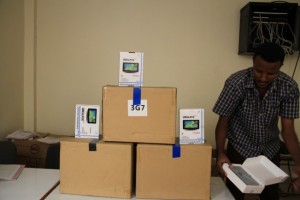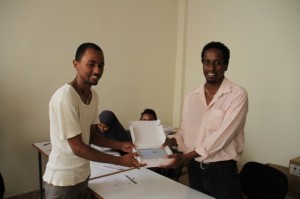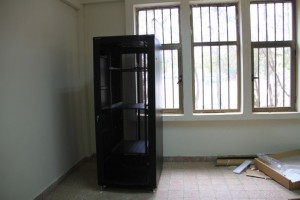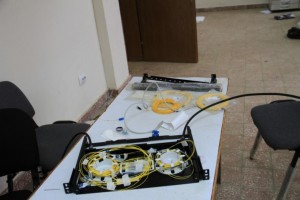By: Shemsdin Mohammed/Public & International Relation Directorate
Haramaya University College of Health and Medical Sciences (CHMS) has distributed 1,000 tablet computers for 5th year medical students.
According to Dr. Tekabe Abdosh, lecturer at CHMS and coordinator of the Medical Education Partnership Initiative (MEPI) Haramaya University, a project of School of Medicine College with visions to materialize targets the usage of tablets, the project plans to buy affordable tablets, which cost around 2,000 Birr, upload text books on the tablet and then distribute the devices to students.


Dr. Tekabe explains that the tablet computers have multipurpose in higher education to meet the need of resources with increased number of students joining higher institution: saving search time, saving money allocated for buying books every year, accessibility, preservation and reservation. He added that students signed agreement to pay when they reached at internship to keep the continuity of revolving fund for new coming medical students i.e. the income collected from students would be used to buy another round of tablets for upcoming batches. MEPI also purchased simulation materials to scaling up the surgical skill lab to ease practical session.

Among the students received the tablet computers was Natan Mulubrihan, a 5th year medical student. He told HU Online that he was very impressed by the donation the College offered them. He said that they are looking for long time to have such tablet and such donations are important for the College’s students especially for internship students to have different advantages. Mekiya Edris, a 5th year medical student, also said that the tablet computers have multipurpose in their education to meet the need of resources with increased number of students joining higher institution: saving search time, saving money allocated for buying books every year, accessibility, preservation and reservation. Both students thanked the College and the Medical Education Partnership Initiative (MEPI) project.
According to Dr. Tekabe, the main objectives of the project are: to improve the medical education system by increasing the number of physicians and quality of training, to build human capacity through enhanced recruitment and retention of qualified academic medical faculty and to enhancement of research and bioethics capacity.


The project is financed via US Department of Health and Human Services (DHHS), Health Resources and Service Administration (HRSA). The MEPI project in Ethiopia was initiated on September 1, 2010, but active implementation of activities was started on May 1, 2011. Currently, at the end of third quarter of the fifth year, MEPI is working with full capacity and in all focuses area and towards major objectives.
The project has given support through extra teaching session for medical students by paying incentives for the instructors, inviting of guest lecturers when there is shortage of man power like pediatrics, surgery, pathology and anatomy, and purchasing of different supportive text books and etc
Currently, the project is working to scale up the IT infrastructure of the college by installing local area network, establishing the E-lab and e Granary installation. In addition, MEPI has purchased around 84 desk top computers, 15 laptops and other ICT materials by paying around 4 million Birr.
